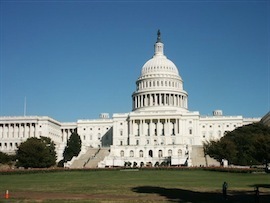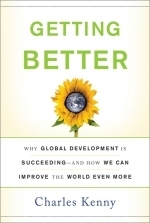Matthew Yglesias's Blog, page 2382
March 21, 2011
Making Good on the Promise of Libya
I was arguing earlier with a colleague who's more favorably disposed to the Libya intervention than I am and one thing we kept coming back to is Bahrain and Yemen where US-backed regimes have been killing peaceful protestors, often with American arms. And it seems to me that this point needs to be brought out of the dark shades of hypocrisy allegations and into the warm sunlight of policy proposals. In other words, if the point of intervening in Libya is to establish a precedent that dictators you can't massacre people to remain in power then the Obama administration needs to toughen its line on Bahrain and Yemen in order to make that work. If the point of intervening in Libya is to have a "demonstration effect" that bolsters the forces of liberalization in the Arab world, then the Obama administration needs to toughen its line on Bahrain and Yemen.
The point isn't that failure to do so is hypocritical (though it is hypocritical), it's that it's undermining the policy. Intervening in Libya strikes me as a bit of a reckless gamble with an essentially unbounded set of possible downside risks. But at the very least, the fact that we're doing it only serves to strengthen the case that we need to be taking the modest easy steps available to us to advance the same goals elsewhere in the region.


The Fed Plays a Major Role in Everything

Here's an absurd argument from Daniel Mitchell at Cato:
To put it mildly, the Federal Reserve has a dismal track record. It bears significant responsibility for almost every major economic upheaval of the past 100 years, including the Great Depression, the 1970s stagflation, and the recent financial crisis. Perhaps the most damning statistic is that the dollar has lost 95 percent of its value since the central bank was created.
It's difficult to know how to make sense of the claim that the combination of mild inflation and compound interest means currencies decline a lot in value over giant time scales. If you assume governments should put a very strong priority on the interests of people who want to save large sums of money in shoeboxes, I guess this is a damning statistic. But it seems to me that the relevant issue is that real income in the United States has increased enormously over the past 100 years and that we've done better in this regard than most countries.
As for the Fed's failures, Mitchell's going to easy on them. A central bank, by definition, bears significant responsibility for all macroeconomic crises. The job of a central bank is to avoid macroeconomic crisis. When one happens, they're screwing up. But by the same token, every time there's not a major macroeconomic crisis they're doing something right. Remember when the 1987 stock market crash wasn't followed by a giant recession? Remember when the economy recovered super-rapidly from the 1982 recession? Remember when wages and incomes grew steadily for 30 years between 1945 and 1975? Monetary policy is everywhere, through the good times and the bad. In part for that reason I don't think "ending" the Fed would achieve anything (though if the best political path to reforming it would be to give it a different name, I'm happy to believe that's an "end the Fed" agenda) since a country with a currency needs to have a monetary policy of some kind. But where I agree with Mitchell is that normally after a huge macroeconomic disaster we have a serious push for monetary reform. This time around, though, we've seen a counterproductive polarization between a minority faction of goldbug cranks and an establishment that merely wants to circle the wagons and pretend not to see the problem here.


Senators Who Want Deficit Reduction Can Reduce the Deficit By Refusing to Vote in Favor of Deficit-Increasing Measures

No legislative body in the world can match the United States Senate for preening self-regard, and I think only the Senate could produce a document similar to the one Lori Montgomery profiles here:
More than 60 senators from both parties are calling on President Obama to lead them in developing a comprehensive plan to rein in record budget deficits, a powerful sign of bipartisan willingness to abandon long-held positions on entitlement spending and taxes. In a letter sent Friday to the White House, the 64 senators urge Obama "to support a broad approach to solving our current budget problems" along the lines of recommendations issued last year by a presidentially appointed commission. That plan calls for sharp cuts in government spending, elimination or reduction of dozens of popular tax breaks and an overhaul of Social Security that would include raising the retirement age to 69 for today's toddlers.
The first thing that's ridiculous about this, is that if 64 Senators want to vote for the Simpson-Bowles Commission's recommendations, then there's nothing stopping them from voting for the Simpson-Bowles Commission's recommendations. They don't need support from Barack Obama to do so. If anything, Barack Obama endorsing Simpson-Bowles would make it more difficult for Republicans to endorse it.
The second thing that's ridiculous about this is that the White House has already produced a plan for reducing the budget deficit below the "current policy" baseline. You can find that proposal exactly where you think you'd find it—Barack Obama's Fiscal Year 2012 budget proposal.
The third thing that's ridiculous about this is that congress has already voted on a plan for reducing the budget deficit below the Obama administration's proposal. It's called "do nothing." If you don't repeal the Affordable Care Act, don't do a Medicare "doc fix" and don't extend the Bush tax cuts then the medium-term deficit problem basically goes away. Most people don't regard this as a credible policy trajectory because they think congress wants to do "doc fixes" and wants to extend at least some of the Bush tax cuts. Which is fine. But it means that all a member of congress needs to do in order to effectuate massive deficit reduction is say "I'm open to voting for doc fixes or ACA repeal or tax cut extensions, but only if they're offset—I refuse to vote for any measure that increases the deficit."
That instead they want to write letters to Barack Obama is, again, a testament to the fact that the Senate's preening self-regard is matched only by its lack of comprehension of the issues.


Psychological Damage From Radioactive Accidents

According to an interesting Rob Stein article that ran a week ago in the Post, in past nuclear mishaps the psychological impact of the radiation leak has arguably done more damage than the radiation itself:
Although radiation escaping from a nuclear power plant catastrophe can increase the risk of many cancers and other health problems, stress, anxiety and fear ended up in many ways being much greater long-term threats to health and well-being after Chernobyl, Three Mile Island and other nuclear accidents, experts said Monday.
"The psychological effects were the biggest health effects of all — by far," said Fred Mettler, a University of New Mexico professor emeritus and one of the world's leading authorities on radiation, who studied Chernobyl for the World Health Organization. "In the end, that's really what affected the most people."
Fears of contamination and anxiety about the health of those exposed and their children led to significantly elevated rates of suicidal thinking and anxiety disorders, and rates of post-traumatic stress disorder and depression about doubled, Mettler and others said.
"The effect on mental health was hugely important," said Evelyn Bromet, a professor of psychiatry at Stony Brook University who studied the aftermath of Three Mile Island and Chernobyl. "People's fears about getting cancer, or their children getting cancer, and family and friends dying from radiation exposure were very intense."
That's not to say that radiation is benign. Obviously, it's not. But people have a much more intense fear of radiation than they do of other comparably damaging environmental carcinogens and the long-term impact of that fear can be extremely damaging. The articles make it seem that it's imperative for the Japanese government to maintain its credibility during the crisis so that it can become a provider of accurate information once the immediate disaster is passed. But beyond that, I'm not really sure what you're supposed to do about this. Certainly I'd be freaked out if I lived near a nuclear accident and reading that my own psychological dread of the radiation could be more dangerous than the radiation itself would likely only make me even more neurotic about it. Maybe they should hand out the Bene Gessrit litany against fear on postcards.


Milton Friedman's Rhetorical Problem: And Ours

(cc photo by LateNightTaskForce)
The fact that maximizing economic growth requires constant government intervention in the economy for the purposes of macroeconomic stabilization policy creates a rhetorical problem for people who believe in free markets. Milton Friedman devised a solution to this problem that, as Brad DeLong notes, though clever has also misled a lot of people. The first step is to deny that discretionary fiscal policy has a legitimate role in macroeconomic stabilization. The second step is to try to pretend that monetary policy is somehow not government intervention in the economy:
In the 1950s and 1960s and 1970s Milton Friedman faced a rhetorical problem. He was a laissez-faire libertarian. But he also believed that macroeconomic stabilization required that the central bank be always in the market, buying and selling government bonds in order to match the supply of liquid cash money to the demand, and so make Say's Law true in practice even though it was false in theory.
Such a policy of constant government intervention to continually rebalance aggregate demand is hardly a laissez-faire hands-off libertarian policy, is it?
Friedman, however, set about trying to maximize the rhetorical distance between his position–which was merely the "neutral," passive policy of maintaining the money stock growth rate at a constant–and the position of other macroeconomists, which was an "activist," interventionist policy of having the government disturb the natural workings of the free market. Something went wrong, Friedman claimed, only when a government stepped away from the "neutral" monetary policy of the constant growth rate rule and did something else.
As a marketing tactic, this was a huge success. But it wound up obscuring from people the fact that there was no real disagreement between a Friedman position and the Keynesian one on the question of whether or not "big government" is charged with boosting demand to re-inflate a depressed economy. And as it happens you don't need to go back to Friedman to find that, historically speaking, fans of unrestrained capitalism haven't denied the importance of activist policy as a stabilizing measure. Here, for example, is Frédéric Bastiat on fiscal stimulus in "What Is Seen and What Is Not Seen":
As a temporary measure in a time of crisis, during a severe winter, this intervention on the part of the taxpayer could have good effects. It acts in the same way as insurance. It adds nothing to the number of jobs nor to total wages, but it takes labor and wages from ordinary times and doles them out, at a loss it is true, in difficult times. As a permanent, general, systematic measure, it is nothing but a ruinous hoax, an impossibility, a contradiction, which makes a great show of the little work that it has stimulated, which is what is seen, and conceals the much larger amount of work that it has precluded, which is what is not seen.
For the country to prosper over time, people on both the left and the right need to have this straight. As I put it in my article on the Fed:
This free lunch is available amidst deep recessions because such events are defined by the widespread idling of resources. A recession means the country has able-bodied people who aren't working, factories that aren't running, and office space and storefronts that are vacant. Fiscal and monetary stimulus aims to mobilize that excess capacity. When there is no excess capacity, printing money to keep rates low will simply lead to inflation. The country's ability to produce money may not be limited, but its ability to produce goods and services is, and inflation is what happens when the government attempts to stimulate demand above the country's ability to produce. Increasing productive capacity is the key to long-term prosperity, but adequately matching demand to current capacity is the key to the short-term employment and economic growth picture.
People on the right seem to have forgotten the conclusion of this argument, and I worry that we've seen over the past three years that all too many of the people on the left who have the right conclusion don't fully understand the implications. Hence the otherwise baffling neglect of federal reserve policy on the progressive side.


The Low Bar

Peter Bergen argues that the intervention in Libya is no invasion of Iraq:
But the military intervention that President Obama authorized against Libya on Saturday — eight years to the day after President George W. Bush announced the commencement of "Operation Iraqi Freedom" — is a quite different operation than the 2003 invasion of Iraq. Beyond the obvious difference that Obama has not authorized the use of U.S. ground forces in Libya, there are several other differences to consider:
Granting all that follows for the sake of argument, isn't this a strange way for Iraq to impact the structure of debate? Is "less misguided than the invasion of Iraq" really a reasonable standard for policy to aspire to? I agree that this should turn out better than Iraq did. But will it turn out better than Somalia? Does it represent a reasonable allocation of resources? "Better than Iraq" is a very low bar for a foreign policy initiative to pass.


March 20, 2011
Lack of Congressional Authorization for Use of Force is an Abdication of Responsibility, Not a Power Grab
Over on my Facebook page there's a bit of a discussion going about then-Senator Barack Obama's statement that "The President does not have power under the Constitution to unilaterally authorize a military attack in a situation that does not involve stopping an actual or imminent threat to the nation."
Given what's happening in Libya, that's obviously a form of hypocrisy you can believe in. Then again, it's not particularly surprising hypocrisy. From Harry Truman on, all presidents have in practice asserted the power to authorize military without congressional approval and I never for a moment believed that Barack Obama would abandon this practice if he became president.* The fact that the constitution seems to clearly rule this out hasn't been a barrier to anyone's practical conduct for decades. But the one observation I would make about this, is that while the trend toward undeclared military incursions is often described as a kind of presidential "power grab" it's much more accurately described as a congressional abdication of responsibility. Even if you completely leave the declaration of war business aside, congress' control over the purse strings still gives a determined congressional majority ample latitude to restrain presidential foreign policy. The main reason congress tends, in practice, not to use this authority is that congress rarely wants to. Congressional Democrats didn't block the "surge" in Iraq, congressional Republicans didn't block the air war in Kosovo, etc. And for congress, it's quite convenient to be able to duck these issues. Handling Libya this way means that those members of congress who want to go on cable and complain about the president's conduct are free to do so, but those who don't want to talk about Libya can say nothing or stay vague. Nobody's forced to take a vote that may look bad in retrospect, and nobody in congress needs to take responsibility for the success or failure of the mission. If things work out well in Libya, John McCain will say he presciently urged the White House to act. If things work out poorly in Libya, McCain will say he consistently criticized the White House's fecklessness. Nobody needs to face a binary "I endorse what Obama's doing / I oppose what Obama's doing" choice.
Which is all just to say that presidents will go back to accepting congressional authorization for the use of force as a binding constraint when congress starts actually wanting that authority.
I also think you could offer a lawyerly defense here wiggle around the word "unilaterally." You could say that this is a very multilateral operation conducted by NATO under legal authorization from the United National Security Council and that congress de facto authorized it by assenting to the North Atlantic Treaty and the UN Charter. But the trend is toward all postwar presidents asserting broad "commander in chief" powers and Obama's no exception.


Agendas and Influence
David Greenberg has an excellent essay on bad last chapters of public policy books that I think really puts the finger on the problem here:
But in the end, most authors have themselves to blame. Having immersed themselves in a subject, almost all succumb to the hubristic idea that they can find new and unique ideas for solving intractable problems. They rarely do, and even works that do usher in specific reforms or broad social transformations — from "The Jungle" to "The Feminine Mystique" — do so by raising awareness about an issue, not by providing ready-to-go blueprints.
To put this more formally, the reason "solutions to the problem" generally fall flat is that in most cases the biggest way a book can contribute to solving a problem is simply to initiate awareness that the problem exists. Generally speaking, for either market solutions, communitarian solutions, or regulatory solutions to problems to exist people need to widely acknowledge the existence and significance of the problem. But if people do widely acknowledge the existence and significance of the problem then you're a good part of the way to the solution right there.


Arab League Backtracks on Support For Libya Intervention
They're calling backsies:
A coordinated attack by Western forces targeting Libyan air capabilities and armor appears to have succeeded in damaging Libyan military installations and armor, but Arab support for the no-fly zone may be waning.
Arab League head Amr Moussa told reporters Sunday that the Arab league thought the use of force was excessive following an overnight bombing campaign that Libya claims killed at least 48 people.
"What we want is civilians' protection, not shelling more civilians," he was quoted saying by the Associated Press.
Not sure what's really happening here, but vocal support from the Arab League was supposed to make this different from other western military strikes on Arab countries.


Getting Better

Fifty years ago, Africa was more and Europe and America were rich, and over the past fifty years per capita GDP has only diverged further. But Charles Kenny's Getting Better: Why Global Development Is Succeeding–And How We Can Improve the World Even More argues that it's a mistake to read this as implying that global development has been a failure. Not only have many poor people gotten richer in places like India and China, even in the parts of Africa where people haven't gotten richer, quality of life has improved. Child mortality rates have plummeted, education is more widespread, political systems are freer, there's less violence, diseases have been cured, etc.
It's persuasive and a very pleasant short book. One section close to my heart (though somewhat distant from the core point of the argument) wonders why it is that mustering some optimism about the trajectory of human history is considered a "right-wing" view when "a century of unprecedented global improvement in quality of life was also one of unprecedented growth in the size of government."
The key policy points (I think) are that if rich countries want to help we should permit more immigration from poor countries, stop trying to impose destructive intellectual property rules on poor countries, stop offering military assistance to repressive regimes, and bolster morale about the fact that foreign aid has been successful at promoting public health in the past and can continue to make even more progress in the future.


Matthew Yglesias's Blog
- Matthew Yglesias's profile
- 72 followers



